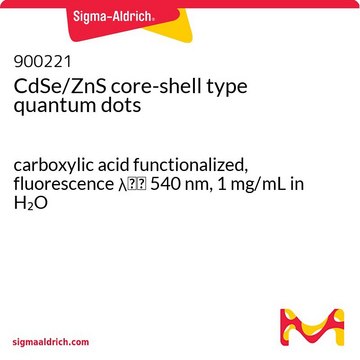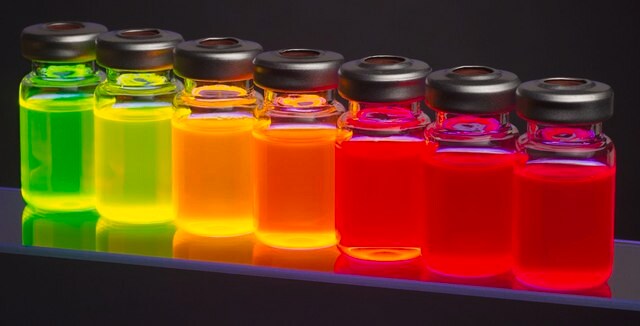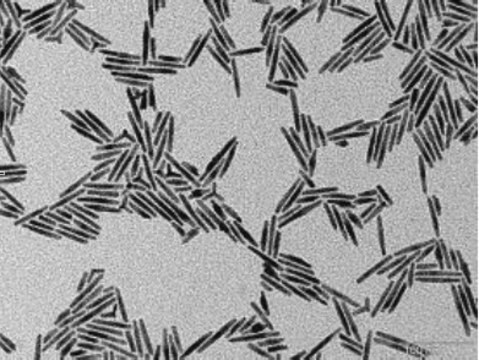900226
CdSe/ZnS core-shell type quantum dots
carboxylic acid functionalized, fluorescence λem 645 nm, 1 mg/mL in H2O
Synonym(s):
Fluorescent nanocrystals, QDs
Sign Into View Organizational & Contract Pricing
All Photos(1)
About This Item
Linear Formula:
CdSe/ZnS
UNSPSC Code:
26111700
NACRES:
NA.23
Recommended Products
form
dispersion
Quality Level
concentration
1 mg/mL in H2O
fluorescence
λem 645 nm
λem 645 nm±10 nm, quantum yield >50%
functional group
carboxylic acid
storage temp.
2-8°C
Looking for similar products? Visit Product Comparison Guide
General description
Reactive group: Carboxylic acid.
Application
The organic layer of the CdS/ZnS or CdSe/ZnS quantum dots (QDs) with carboxylic acid as reactive group consist of a monolayer of oleic acid/octadecylamine and a monolayer of amphiphilic polymer. The total thickness of organic layers on these QDs is approximately 4 nm. They find many applications in bioimaging and biosensing.
Caution
Do not freeze.
Legal Information
Product of Ocean Nanotech, LLC.
hcodes
pcodes
Hazard Classifications
Aquatic Chronic 2
Storage Class
12 - Non Combustible Liquids
wgk_germany
WGK 3
flash_point_f
Not applicable
flash_point_c
Not applicable
Choose from one of the most recent versions:
Already Own This Product?
Find documentation for the products that you have recently purchased in the Document Library.
Hong Xu et al.
ACS applied materials & interfaces, 5(8), 2901-2907 (2013-04-05)
The excellent optical properties of quantum dots (QDs), such as high brightness, high photostability, continuous absorption, and narrow emission bandwidth, make them ideal as optical labels to develop QD-based immunohistofluorescence (IHF) imaging for multiplexing cancer biomarker detection on formalin-fixed and
Zengyan Wei et al.
Soft matter, 8(26), 6871-6875 (2012-09-18)
Genetically-engineered collagen peptides were assembled into freestanding films when QDs are co-assembled as joints between collagen domains. These peptide based films show excellent mechanical properties with Young's modulus of ~20 GPa, much larger than most of multi-composite polymer films and
Lily Yang et al.
Small (Weinheim an der Bergstrasse, Germany), 5(2), 235-243 (2008-12-18)
Epidermal growth factor receptor (EGFR) targeted nanoparticle are developed by conjugating a single-chain anti-EGFR antibody (ScFvEGFR) to surface functionalized quantum dots (QDs) or magnetic iron oxide (IO) nanoparticles. The results show that ScFvEGFR can be successfully conjugated to the nanoparticles
Our team of scientists has experience in all areas of research including Life Science, Material Science, Chemical Synthesis, Chromatography, Analytical and many others.
Contact Technical Service






